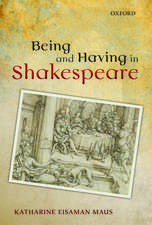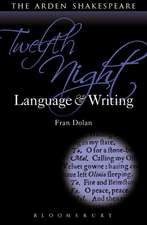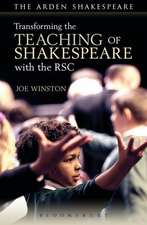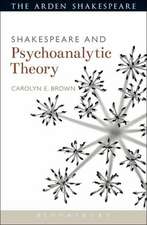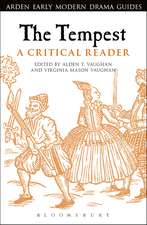Broadcast your Shakespeare: Continuity and Change Across Media
Editat de Dr Stephen O'Neillen Limba Engleză Hardback – 13 dec 2017
| Toate formatele și edițiile | Preț | Express |
|---|---|---|
| Paperback (1) | 230.43 lei 6-8 săpt. | |
| Bloomsbury Publishing – 26 iun 2019 | 230.43 lei 6-8 săpt. | |
| Hardback (1) | 597.22 lei 6-8 săpt. | |
| Bloomsbury Publishing – 13 dec 2017 | 597.22 lei 6-8 săpt. |
Preț: 597.22 lei
Preț vechi: 857.87 lei
-30% Nou
Puncte Express: 896
Preț estimativ în valută:
114.31€ • 124.21$ • 96.09£
114.31€ • 124.21$ • 96.09£
Carte tipărită la comandă
Livrare economică 21 aprilie-05 mai
Preluare comenzi: 021 569.72.76
Specificații
ISBN-13: 9781474295116
ISBN-10: 1474295118
Pagini: 336
Ilustrații: 4 bw illus
Dimensiuni: 129 x 198 mm
Greutate: 0.45 kg
Editura: Bloomsbury Publishing
Colecția The Arden Shakespeare
Locul publicării:London, United Kingdom
ISBN-10: 1474295118
Pagini: 336
Ilustrații: 4 bw illus
Dimensiuni: 129 x 198 mm
Greutate: 0.45 kg
Editura: Bloomsbury Publishing
Colecția The Arden Shakespeare
Locul publicării:London, United Kingdom
Caracteristici
A
major
collection
on
a
timely
topic
in
Shakespeare
studies
Notă biografică
Stephen
O'Neillis
a
Lecturer
in
the
Department
of
English,
National
University
of
Ireland
Maynooth,Ireland.
His
most
recent
book
isShakespeare
and
YouTube:
New
Media
Forms
of
the
Bard(Bloomsbury,
2014).
Cuprins
AcknowledgementsList
of
IllustrationsNote
on
Procedures
and
Abbreviations
Note
on
ContributorsIntroduction:
'"Sow'd
and
Scattered":
Shakespeare's
Media
Ecologies'
Stephen
O'Neill,
Maynooth
University,
IrelandPart
I:
The
Politics
of
Broadcast(ing)
Shakespeare
1.
'Broadcasting
Censorship:
Hollywood's
Production
Code
andA
Midsummer
Night's
Dream'
Darlena
Ciraulo,
University
of
Central
Missouri,
USA2.
'Broadcasting
the
Bard:
Orson
Welles,
Shakespeare,
and
War'
Robert
Sawyer,
East
Tennessee
State
University,
USA3.
'This
Distracted
Globe
This
Brave
New
World:
Learning
from
the
MIT
Global
Shakespeares'
Twenty-First
Century'
Diana
Henderson,
MIT
Boston,
USA
4.
'"Once
more
to
the
breach!":
Shakespeare,
Wikipedia's
Gender
Gap,
and
the
Online,
Digital
Elite'
David
C.
Moberly,
University
of
Minnesota,
USAPart
II:
Genre
and
Audience
5.
'Emo
Hamlet:
Locating
Shakespearean
Affect
in
Social
Media'
Christy
Desmet,
University
of
Georgia,
USA
6.
'"It
Is
Worth
the
Listening
To":
The
Phonograph
and
the
Teaching
of
Shakespeare
in
the
Early
Twentieth-Century
America'
Joseph
Haughey,
Northwest
Missouri
State
University,
USA
7.
'Juliet,
Tumbld:
Fan
Renovations
of
Shakespeare's
Juliet
on
TumblrT',
Kirk
Hendershott-Kraetzer,
Olivet
College,
USA8.
'"Certain
o'er
incertainty":Troilus
and
Cressida,
Ambiguity
and
theLewisepisode
"Generation
of
Vipers"',
Sarah
Olive,
University
of
York,
UKPart
III:
Broadcast
the
Self:
Celebrity
and
Identity
9.
'Vlogging
the
Bard:
Serialization,
Social
Media,
Shakespeare'
Douglas
Lanier,
University
of
New
Hampshire,
USA10.
'Tweeting
Television
/
Broadcasting
the
Bard:
@HollowCrownFans
and
Digital
Shakespeares',
Romano
Mullin,
Queen's
University
Belfast,
UK
11.
'"Somewhere
in
the
World
.
Someone
misquoted
Shakespeare.
I
can
sense
it":
Tom
Hiddleston
performing
the
Shakespearean
online'
Anna
Blackwell,
DeMontfort
University,
UKAfterword:
Courtney
Lehmann,
University
of
the
Pacific,
USA
NotesIndex
Recenzii
The
result
is
a
wide-ranging
and
incisive
study.Broadcast
Your
Shakespeareis
a
valuable
guide
to
Shakespeare
as
he
has
been
repeatedly
remade.
The book is an expansive, wide-ranging assessment of what it means to broadcast Shakespeare.Because of its carefully balanced attention to both platform and user,Broadcast Your Shakespearemanages successfully to navigate a wide range of adaptive processes, offering more than a selection of interesting case studies. As such, it points the way to valuable new directions in the field of appropriation studies.
The book is an expansive, wide-ranging assessment of what it means to broadcast Shakespeare.Because of its carefully balanced attention to both platform and user,Broadcast Your Shakespearemanages successfully to navigate a wide range of adaptive processes, offering more than a selection of interesting case studies. As such, it points the way to valuable new directions in the field of appropriation studies.

